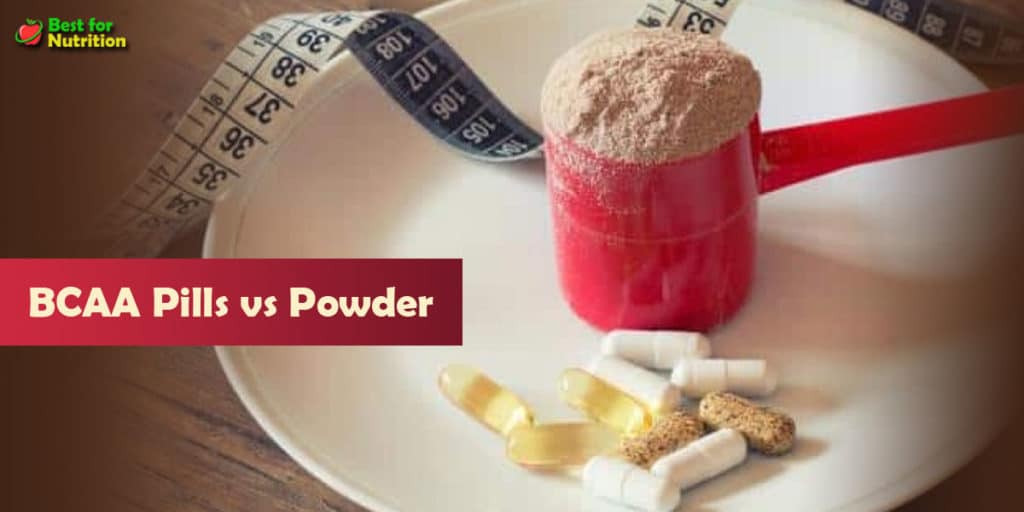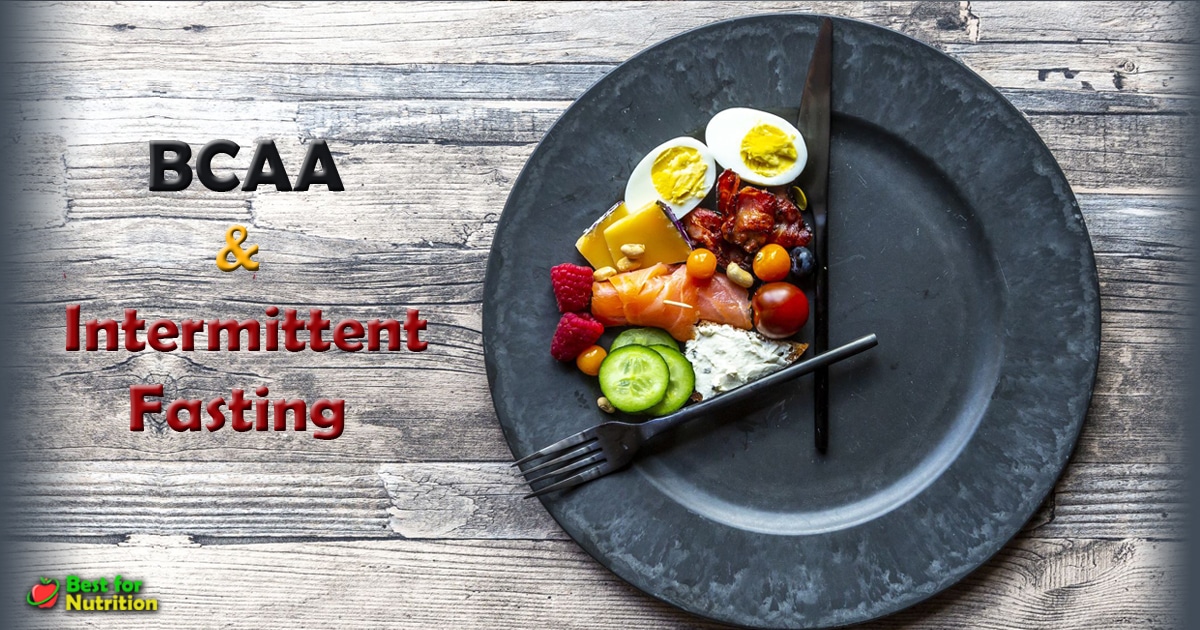BCCAs or Branched Chain Amino Acids are 3 essential amino acids that must be obtained from one’s diet. This is required for protein synthesis, muscle growth, and other physiological functions in the human body.
BCAA supplements are available as powders or as tablets/ capsules in the market and don’t require a prescription.
A common query asked while ordering a BCAA supplement is ‘Are BCAA pills or powder better?’. To find the answer, read on to understand the pros and cons of BCAA pills and powders, and which one would make a better choice.

Why Should You Take BCAA Pills or Powders?
BCAA supplements are used to bridge the protein gaps in one’s daily diet, to aid many metabolic and physiological functions. (1)
Athletes or bodybuilders may require additional BCAA for recovery and muscle protein synthesis (MPS) post-intensive workouts. (2)
All BCAA supplements, whether pills or powders are designed to deliver the 3 essential amino acids, L-leucine, L-isoleucine, and L-valine. Their efficacy depends on the dosage and how fast it is metabolized by the body.
Depending on the dosage and timing when it is taken, BCAA supplements work faster and with acute precision especially on muscle soreness and recovery than regular protein powders. (3)
Summary: The use of BCAA supplements ensures specific delivery of the 3 essential amino acids. The dosage and timing of the supplements typically define the efficacy and accuracy of the BCCAs action on muscle recovery.
The Pros and Cons of BCAA Pills vs Powders
People who would like to try BCAA supplements have a choice to choose between pills and powders.
One should keep in mind the advantages and disadvantages of pills and powders and decide which one delivers better, before ordering it.
Listed are some of the pros and cons of BCAA powders vs capsules for your understanding.
Pros and Cons of BCAA Pills
Pros
- BCAA capsules or tablets are easy to consume and perfect for on-the-go intake. Small, portable, pre-measured, and requiring little water, they are absolute time-savers and convenient to take.
- Since timing is crucial, it is easy to pop a pill rather than spend time measuring and mixing.
- The best part is, unlike powders, pills do not require any flavors and hence what you consume is truly natural and healthy.
- One more convenient point is, the per-day dosage can be divided into the number of pills and taken as required for before, between, and post-workouts.
Cons
- One of the biggest issues with BCAA pills is getting the dosage right. Since pills come in standard measures it is difficult to adjust dosages. So, you either end up taking more or less than what you may require.
- Another problem with pills is the absorption time. When a capsule is ingested, the outer covering has to be digested before the contents are absorbed by the body. That takes time and you may have to account for it when you are timing.
- BCAA capsules might have fillers or binders to ensure content stability and artificial ones may be harmful to your health.
Summary: BCAA pills are easy to consume, portable, require no flavors, and convenient to consume dosage-wise. But getting the required quantity and absorption time are general issues in consuming pills.
Pros and Cons of BCAA Powders
Pros
- The best advantage that BCAA powders have over pills is that they can pack powerful doses in one shot. Pills have pre-measured doses and the quantity cannot be customized. Powders allow you to adjust the daily dose to your liking.
- Powders are faster acting than pills because they start getting absorbed immediately on consumption. For a supplement that requires rigid time-adherence, powders are your best bet.
- While an emphasis on flavor is trivial, it does sound interesting to take a supplement that is both delicious and fast-acting to give you desired results.
Cons
- BCAA powder may sound like a good idea, but they have their downside too. Powders usually come as big tubs that may not be suitable to lug around everywhere. Also, they may not be full quantity-wise.
- Also, you need to consider that their working capacity is time-bound. Hence, it matters, when you mix the dose and when you consume them.
- An additional issue to watch out for in BCAA powders is the use of artificial food additives and sweeteners commonly used to retain loose consistency and maintain low calorific value.
Summary: The benefits of BCAA powders include quick absorption time and the potent dosage they can pack in a day. Besides the natural flavors can spur regular intake of the BCAA powders. The downside is limited to the size of the canisters, mixing and intake time-gap, and use of additives.
BCAA Powders vs Capsules: Which is the Better Option?
BCAA supplements are usually chosen according to an individual’s needs and the primary reason why it is taken.
If it is the convenience you are looking for, or if you are constantly on the move, then capsules may be a good choice. If you require strong doses of BCAA for recovery after intensive workouts, then the powder will be the ideal choice.
If you enjoy drinking protein shakes before or after your workouts, then a powder supplement is more suited for your needs.
For optimal coverage, one can use both pills and powders alternatively in a day to get the best of both.
A 3 times-a-day dose can be taken as powders in the mornings and evenings when you have more time to mix, and capsules in the afternoon if you are on the go.
Apart from the pills or powder question, there are several other factors one should consider before going in for a BCAA supplement.
Check for bioavailability of the BCAAs, other added ingredients, and adherence to approved dosage recommendations. Also, the ratio of BCAAs with a higher value of L-leucine for better efficacy and performance matters. (4)
Summary: BCAA capsules are more convenient and can be taken anywhere, anytime. BCAA powder supplement doses are more customizable and can be taken in larger doses after intensive workouts. They also mix well if you prefer to take them as a post-workout drink.
Frequently Answered Questions (FAQs)
What to Look for in a BCAA Supplement?
Solubility or how quickly it mixes in water or other liquids matter if the powder is your choice. Flavored versions may be good but check for artificial flavors, colors, fillers, or artificial sweeteners.
While selecting pills check for chemical additives or other added ingredients apart from BCAAs.
How Much BCAA Should I Take Daily?
BCAAs supplementation can differ depending on a person’s needs and intensity of workouts. You can take BCAAs at one shot or split the dose and take it 3 times a day, as powder, pills, or a combination of both.
The National Institutes of Health in their list of dietary supplements used for exercise and athletic performance have affirmed that BCAAs up to 20 gms a day or less for up to 6 weeks have no safety concerns or reported adverse effects (5).
What Time is Most Effective for BCAA Supplementation?
BCAAs can be taken before, in-between, or after workouts if you plan to split the per day dose. Intake of 5-10 gm BCAA prior to workouts can provide the required amino acid boost and reduce fatigue, once you start exercising.
Another 5 gm can be taken intra-workout to maintain energy and stamina and 5-10 gm is ideally taken after the exercise to aid in recovery from muscle injuries or damage.
The Final Note
BCAA supplements are important for those who get insufficient protein from their diet for protein synthesis. Sportsperson, athletes or bodybuilders too might need these supplements to help with post-recovery.
BCAA supplements are best taken via pills or powder form. The pills are easy to use, portable, and have no extra flavors. The downside of pills includes longer absorption time and swallowing more pills for a heavier dose.
Powders provide the benefit of potent doses when required, instant absorption, and delicious flavors to relish. The only cons of powders are portability due to the big tubs they come in and the time required for mixing.
Several factors have to be considered before choosing a pill or powder and sometimes, alternate use of both in a day can result in the benefits of using both the forms.





